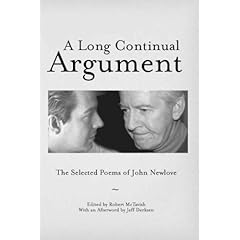No Pleasure
 No one in Canadian poetry does existential misery like John Newlove. Maybe John Thompson, but generally with lest directness than Newlove. At his best, Patrick Lane comes close; Fraser Sutherland's a contender, but Newlove is King of Pain. Outside Canada, he's maybe topped only by Weldon Kees and Philip Larkin. It's not my favourite poetic mood, but when it's rendered well, it can make for poetry every bit as memorable as more positively charged verses.
No one in Canadian poetry does existential misery like John Newlove. Maybe John Thompson, but generally with lest directness than Newlove. At his best, Patrick Lane comes close; Fraser Sutherland's a contender, but Newlove is King of Pain. Outside Canada, he's maybe topped only by Weldon Kees and Philip Larkin. It's not my favourite poetic mood, but when it's rendered well, it can make for poetry every bit as memorable as more positively charged verses.I'm reviewing the new Selected Newlove, A Long Continual Argument, and was particularly struck by the poem, "No Pleasure," taken from Newlove's GG-winning Lies. I've had some anhedonic episodes myself this winter, and it struck a chord. There are some excellent insights into this sort of thing in another book I read recently, Oliver Sacks's Musicophilia, about how hearing a funeral march played buoyed his spirits during a period of protracted anhedonia, when nothing else did. Misery does indeed love company.
Hear me read "No Pleasure."

No comments:
Post a Comment